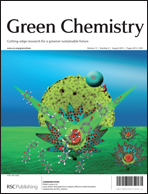“Accelerated aging” is a simple and conceptually novel methodology for the synthesis of functional metal–organic materials, which seeks to provide a scalable, mild and environmentally-friendly alternative to solution-based or mechanochemical syntheses. Accelerated aging draws inspiration from slow processes of geological biomineralization and mineral neogenesis, and adapts them for the low-energy and solvent-free synthesis of modern metal–organic materials. This systematic study outlines the development of an accelerated aging synthesis of microporous frameworks from metal oxides CoO and ZnO. Whereas metal oxides often require high temperatures or aggressive reagents, accelerated aging allows their spontaneous transformation into porous materials under surprisingly mild conditions, akin to those of molecular self-assembly (humid air, up to 45 °C). Here, we describe how accelerated aging can be optimized for the one-step synthesis of multi-gram amounts of microporous solids. As targets, we selected popular zeolitic imidazolate frameworks (ZIFs): the sodalite-topology ZIF-8, its cobalt analogue ZIF-67, and a related zeolite RHO framework. Unlike conventional solution or mechanochemical syntheses, accelerated aging is diffusion-controlled and does not require continuous agitation, bulk solvent or high temperature. The syntheses of ZIF-8 and ZIF-67 contrast the conventional paradigm of metal–organic framework synthesis, by demonstrating that microporous materials can be spontaneously and efficiently assembled from a close-packed metal oxide without using solvents, high temperature or other activation (e.g. microwave, sonochemical, mechanochemical).


 Please wait while we load your content...
Please wait while we load your content...